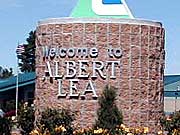Albert Lea: Up from the ashes
July 1, 2004
 |
| Downtown Albert Lea. (MPR Photo/Jeff Jones) |
Albert Lea, Minn. — The city of Albert Lea, in far southern Minnesota, has struggled the past few years after the loss of its biggest employer. But city officials say things are looking up, and they're optimistic that Albert Lea will regain the hundreds of jobs it lost.
MPR's All Things Considered explores the city's challenges, and the history of the area, in a special broadcast from The Lakeside Cafe in Albert Lea on Thursday.
 | |||
Albert Lea's name has been synonymous with meatpacking for decades. The first plant started as a butcher shop back in 1877, became the Albert Lea Packing Co., and later a Wilson plant. Wilson's operated the Albert Lea plant into the 1980s.
Farmland Foods took over about that time, and operated the plant until it burned down three years ago. Farmland decided not to rebuild, citing the extensive damage to the facility. That meant 500 jobs were lost, dealing a major blow to the local economy.
But city officials are optimistic that those jobs will be recovered through a variety of economic development strategies.
The meatpacking industry has also attracted a sizable number of immigrants to the area, since the jobs available there don't usually require a person to speak English.
In Freeborn County, 10 to 12 percent of the population are immigrants, primarily from Mexico, but also from several African countries. The immigration trends have stirred up tension in the community -- some subtle, some very open.
 | |||
There are several lakes in the region. Downtown Albert Lea sits between two of them. Fountain Lake sits to the north. The city takes its name from the other, larger Lake Albert Lea, which sits east and south of downtown. City officials recently built three fountains in Fountain Lake as a focal point for downtown visitors.
Lake Albert Lea was named after an Army mapmaker who passed through the region during an expedition in the 1830s.
At the time, Lt. Albert M. Lea named two lakes -- Lake Chapeau and Fox Lake. Several years later, an admiring collegue renamed Lake Chapeau as Lake Albert Lea. In the 1850s, the town's earliest settlers mistook Fox Lake for Lake Albert Lea and named their settlement after it. The name stuck -- for both the town and the lake.
Albert Lea himself was a complicated figure. He was a mapmaker for the U.S. Army until the Civil War. He then moved south to join the Confederate Army. He attained the rank of major for the South and retired to Texas after the war.
It wasn't until the 1890s that some Albert Lea residents thought it strange to honor an enemy of the Union with the name of their town, and lobbied to change the name. The effort was defeated, though, by residents who said the name was for the lake and not the man -- and as far as anyone knew, the lake had not taken sides in the war. Besides, they were used to the name by then.
The special broadcast is part of Mainstreet Radio, Minnesota Public Radio's award-winning rural reporting unit.
|
News Headlines
|
Related Subjects
|

